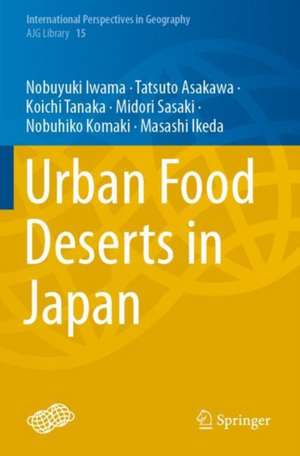Urban Food Deserts in Japan: International Perspectives in Geography, cartea 15
Autor Nobuyuki Iwama, Tatsuto Asakawa, Koichi Tanaka, Midori Sasaki, Nobuhiko Komaki, Masashi Ikedaen Limba Engleză Paperback – 17 apr 2022
| Toate formatele și edițiile | Preț | Express |
|---|---|---|
| Paperback (1) | 729.72 lei 38-44 zile | |
| Springer Nature Singapore – 17 apr 2022 | 729.72 lei 38-44 zile | |
| Hardback (1) | 894.46 lei 3-5 săpt. | |
| Springer Nature Singapore – 16 apr 2021 | 894.46 lei 3-5 săpt. |
Din seria International Perspectives in Geography
- 20%
 Preț: 551.82 lei
Preț: 551.82 lei - 18%
 Preț: 719.28 lei
Preț: 719.28 lei - 20%
 Preț: 555.18 lei
Preț: 555.18 lei - 24%
 Preț: 738.56 lei
Preț: 738.56 lei - 18%
 Preț: 784.79 lei
Preț: 784.79 lei - 18%
 Preț: 727.18 lei
Preț: 727.18 lei - 18%
 Preț: 1010.03 lei
Preț: 1010.03 lei - 18%
 Preț: 727.97 lei
Preț: 727.97 lei - 18%
 Preț: 892.59 lei
Preț: 892.59 lei - 24%
 Preț: 774.88 lei
Preț: 774.88 lei - 24%
 Preț: 724.66 lei
Preț: 724.66 lei - 15%
 Preț: 701.59 lei
Preț: 701.59 lei - 18%
 Preț: 938.83 lei
Preț: 938.83 lei - 18%
 Preț: 885.47 lei
Preț: 885.47 lei - 18%
 Preț: 943.73 lei
Preț: 943.73 lei - 15%
 Preț: 644.95 lei
Preț: 644.95 lei - 15%
 Preț: 644.95 lei
Preț: 644.95 lei - 15%
 Preț: 640.24 lei
Preț: 640.24 lei - 15%
 Preț: 649.06 lei
Preț: 649.06 lei - 15%
 Preț: 642.51 lei
Preț: 642.51 lei
Preț: 729.72 lei
Preț vechi: 960.16 lei
-24% Nou
Puncte Express: 1095
Preț estimativ în valută:
139.65€ • 145.26$ • 115.29£
139.65€ • 145.26$ • 115.29£
Carte tipărită la comandă
Livrare economică 10-16 aprilie
Preluare comenzi: 021 569.72.76
Specificații
ISBN-13: 9789811608957
ISBN-10: 9811608954
Pagini: 237
Ilustrații: XXI, 237 p. 93 illus., 1 illus. in color.
Dimensiuni: 155 x 235 mm
Ediția:1st ed. 2021
Editura: Springer Nature Singapore
Colecția Springer
Seria International Perspectives in Geography
Locul publicării:Singapore, Singapore
ISBN-10: 9811608954
Pagini: 237
Ilustrații: XXI, 237 p. 93 illus., 1 illus. in color.
Dimensiuni: 155 x 235 mm
Ediția:1st ed. 2021
Editura: Springer Nature Singapore
Colecția Springer
Seria International Perspectives in Geography
Locul publicării:Singapore, Singapore
Cuprins
The definition of Japanese food desert issues.- The background of Japanese Food Desert Issues.- Food access and social capital.- Case Study 1 (Central Tokyo).- Case study 2 (a prefectural government city).- Local City.- Measures to address Food Desert Issues.
Notă biografică
Nobuyuki Iwama is a professor of Ibaraki Christian University in Japan. He has worked closely with governments and local communities. In the Japanese Ministry of Economy, Trade and Industry, he was the chairman of the conferences on poor food access issues, and he has been closely engaged in countermeasures of those concerns in Japan. Because his university is located in a declining and aging population area and he is a director of the Global and Communication Center of Ibaraki Christian University, he has a strong interest in revitalization of local communities and development of sustainable living environments. He also manages development programs in many declining and aging population areas. He has published several books and papers on Japanese food desert issues.
Tatsuto Asakawa is a professor in the Faculty of Human Sciences of Waseda University, Japan. He is currently the general affairs director of the Japan Sociological Society. His research interests includesocial structure and spatial structure in urban society, the social atlas, the food desert, disaster research, urban space, and disparity research. He has published several books in the field of urban sociology.
Koichi Tanaka is a professor in the College of Humanities and Social Sciences at Ibaraki University in Japan. He is also a guest professor in the Center for Spatial Information Science at The University of Tokyo in Japan. He works largely on themes dealing with human mobility, transport geography, and economic geography using GIS. His main scientific interests include the quantitative evaluation of spatio-temporal accessibility and evacuation behavior during disasters.
Midori Sasaki has been a professor since 2014 at the Faculty of Human Environmental Studies at Hiroshima Shudo University in Japan. Her research expertise includes agricultural geography and environmental geography with a focus on sustainable agriculture. In recent years, she has been working on the production environment of rice, oilseeds, and cotton in relatively new continental populations such as those in Australia and the U.S., and its dynamics in management and international markets.
Nobuhiko Komaki is a professor of Aichi University in Japan, and he has worked closely with local communities and governments. His research interests include the relationship between retail and urban planning, community development of local cities, the spatial structure of metropolitan areas and spatial analysis using GIS. He has published several papers in the field of urban geography and GIS.
Masashi Ikeda is an associate professor in the Faculty of Commerce at Takushoku University in Japan. His research interests include the geography of food, the distribution system for fruit and vegetables, e-commerce, and mobile supermarkets. He has published several papers on the restructuring of the Japanese distribution system.
Textul de pe ultima copertă
This book introduces the Japanese urban food desert (FD). Currently, Japan has the most rapidly aging society in the world, with a shrinking population and food desert issues in connection with the isolation of the elderly people from their families and local communities. The types of food deserts that Japan is currently facing are likely to occur in many other countries under similar circumstances in the near future. This book serves as a valuable resource for researchers and policymakers who are working on FD issues in Japan as well as in other countries. The book consists of 8 chapters, with each chapter covering a different aspect of FD, and it also includes case studies, one of which is the FD in Tokyo.
Caracteristici
Includes food desert maps based on food access and local-level social capital Presents Japanese urban food deserts Introduces Japanese countermeasures for food desert issues
